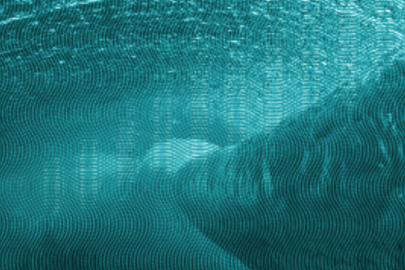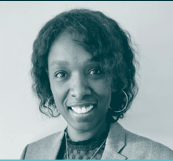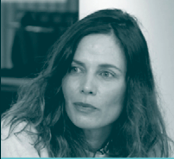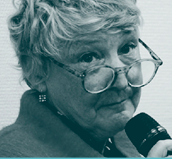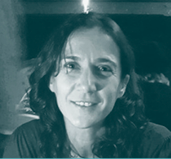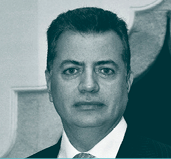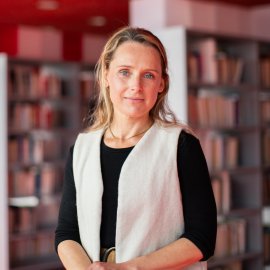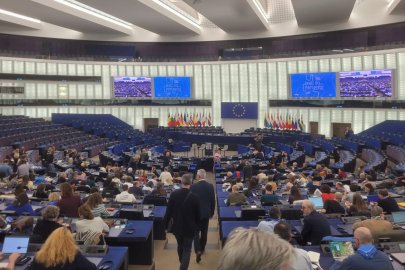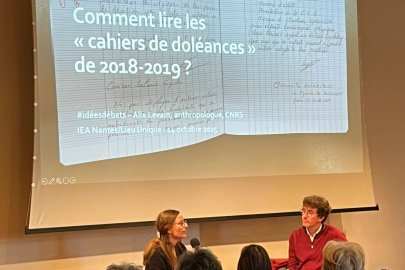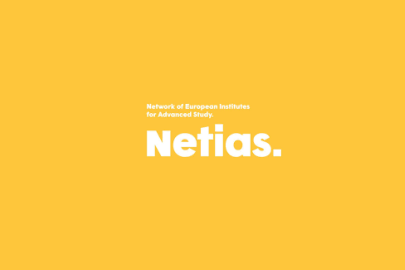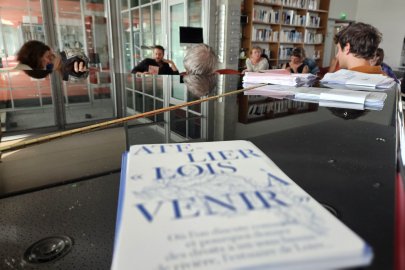In April 2024, the Nantes Institute for Advanced Study hosted the Oceanic Imaginaries workshop, co-organized by Sophie Halart, former Fellow and current Deputy Director of the Institute, and Frantz Mynard, Associate Professor of Law at Nantes Université and Deputy Director of the Center for Maritime and Oceanic Law (CDMO). Over two days, the workshop brought together an exceptional interdisciplinary group of participants to explore the many dimensions of the oceans.
As we approach the opening of the Third United Nations Ocean Conference (Nice, 9–13 June 2025), the reflections sparked during the workshop resonate strongly with the urgent environmental and societal challenges of our time.
The translation of the content is underway. All the materials will soon be available in English.
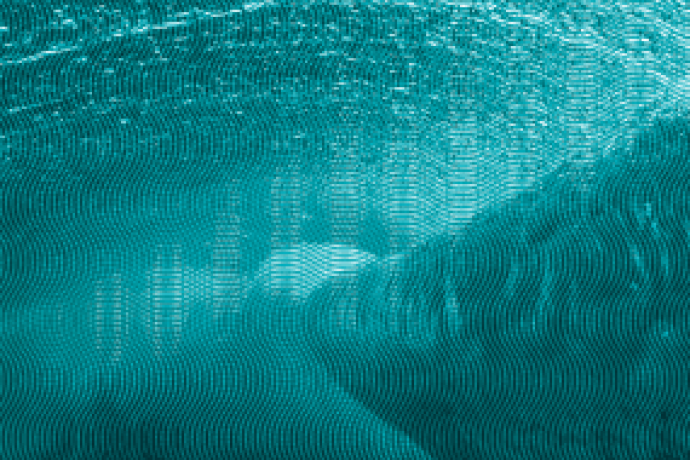
Starting from the tragic Titan submersible accident in 2023, our initial reflection highlighted the often-forgotten limits of our oceanic ambitions, heightened by contemporary technological power. The ocean—by its vastness, pressure, and density—remains a constant reminder of our fundamentally terrestrial nature, embodying both our fascination and our ancestral fears.
Inspired by the pioneering work of figures such as Rachel Carson and Anita Conti, the theme of “oceanic imaginaries” explores our ambivalent relationship to the sea: the origin of life, embodiment of the Romantic sublime, but also a space under threat from excessive human exploitation. In this regard, the ocean is as much a site of wonder as a revealer of today’s crises. As oceanographer Sylvia Earle has written, since the mid-20th century, hundreds of millions of tons of marine life have vanished, while comparable amounts of waste have been dumped into the sea.
The interdisciplinary discussions held during the workshop opened the concepts of “representation,” “line,” and “limit” to new, fertile polysemies, fostering mutual enrichment among the humanities, social sciences, economics, and the visual and literary arts. The invited participants came from a wide range of disciplinary and professional backgrounds, including maritime law, economics, literature and ecocriticism, defense, art history, hydrodiplomacy, and archaeology, among others.
The set of presentations we highlight here constitutes a preliminary cartography of these “oceanic imaginaries,” which we aim to further develop in a forthcoming edited volume. This publication will provide contributors with the opportunity to expand and deepen the reflections initiated during these sessions.
We extend our heartfelt thanks to all the participants for their invaluable contributions, as well as to the teams at the Institute for Advanced Study, the Centre for Maritime and Ocean Law (CDMO), the École Nationale Supérieure Maritime (ENSM), the Jacques Cassard Maritime Vocational High School, and the FIAS program for their indispensable support.
May these explorations continue to inspire our imaginaries, nurture our interdisciplinary curiosity, and strengthen our collective commitment to better understanding and preserving the oceans.
Sophie Halart and Frantz Mynard
Co-organizers of the “Oceanic Imaginaries” workshop

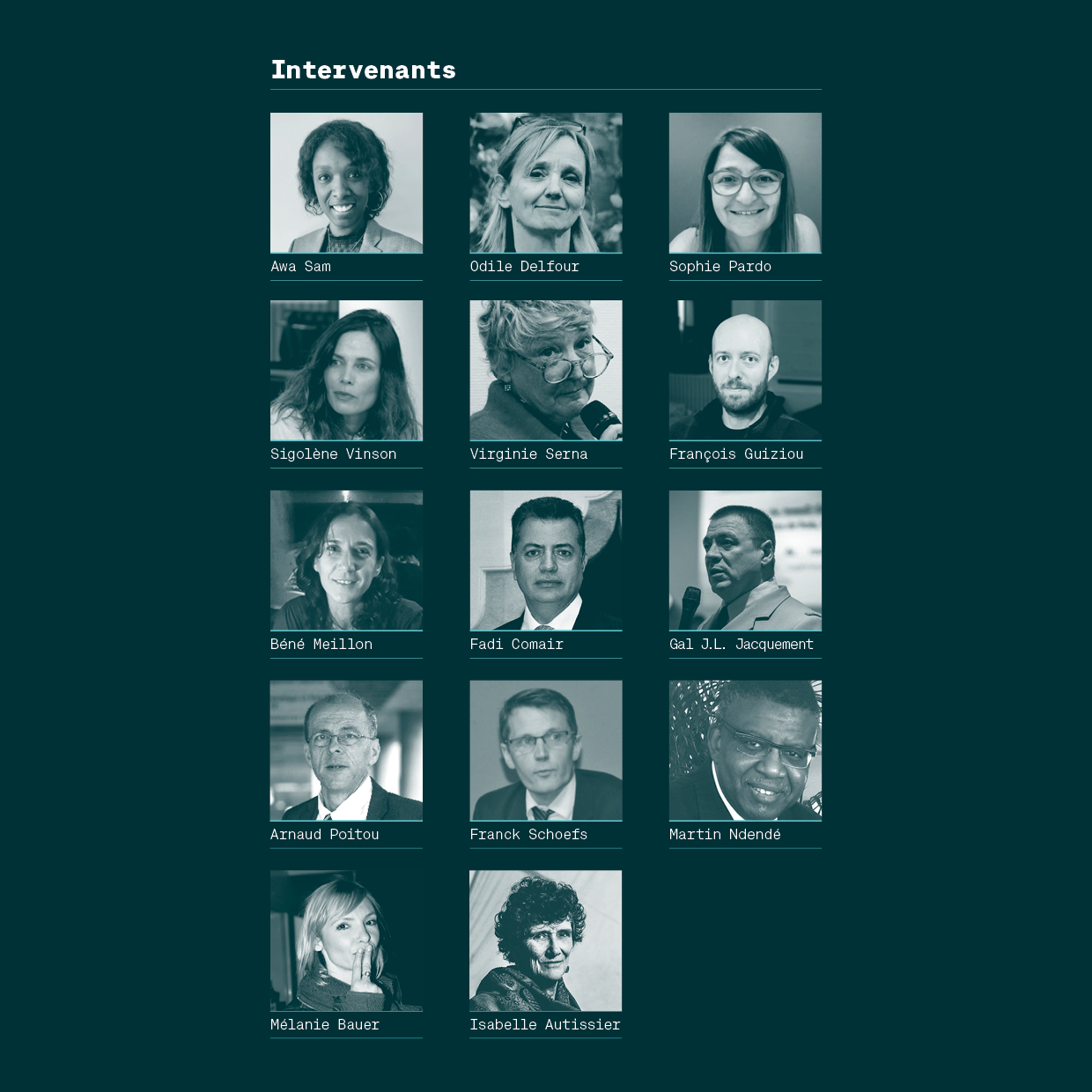
Access the full program of the event
Women and the Seas: Crossed Views on the Contemporary Ocean
Awa Sam, Cheffe de Département de la filière Génie Maritime de l’École Normale Supérieure Maritime de Nantes
Isabelle Autissier, Navigatrice française et présidente d'honneur du WWF-France
Barbara Clerc, Officier
Maëlle Giraud, Officier polyvalent à l'IFREMER
Three women of the sea — Isabelle Autissier, Barbara Clerc, and Maëlle Giraud — opened the Oceanic Imaginaries workshop with a conversation rich in stories and commitments. Moderated by Awa Sam, they shared their unique journeys and deep, personal connections to the ocean, weaving together themes of navigation, ecology, and transmission. From an awareness of invisible upheavals to the need for scientific and intergenerational listening, their dialogue traced the contours of a lived, sensitive, and troubled sea — one that lies at the heart of today’s urgent concerns.
Backwash, Crossings and Immersions: Towards a Reading of Art History in Blue
Sophie Halart, Professeur d’Histoire de l’Art à l’Universidad Católica de Chile, Résidente FIAS / IEA de Nantes 2022/2023
In the face of ecological urgency and the limitations of an art history grounded in principles of stability, clarity, and exteriority, Sophie Halart proposes a reversal of perspective: to think art history from the ocean. Drawing on environmental and decolonial humanities, she calls for a shift away from the discipline’s terrestrial foundations toward a fluid, relational, and immersed epistemology. This “blue tonality” paves the way for an art history attuned to submerged narratives, unstable forms, and the traumatic memories of the Atlantic world.
Romancing Lagoons, Seas, and Oceans: Is It About Becoming a Specialist?
Sigolène Vinson, écrivain
Through a sensitive and committed literary voice, Sigolène Vinson explores the oceans as spaces of inspiration, memory, and challenge. In this reflection, she revisits her deep personal connection to the sea, its profound symbolisms, and the stories it inspires — at the crossroads of fiction, poetry, and ecology.
Spongilla lacustris and the Râble 10: A New Heritage Community
Virginie Serna, Archéologue, Conservateur général du patrimoine au Ministère de la Culture
Through the wreck of the Langeais barge, Virginie Serna offers a sensitive and multifaceted reinterpretation of underwater remains. Situated between debris, archive, and ecological niche, the submerged heritage object becomes a revealing marker of fluvial dynamics and the tensions between forgetting and remembrance. This approach—at the intersection of archaeology, ecology, and the imaginary—resonates with the reflections led by the Parlement de Loire on new ways of thinking about natural entities.
Sea More Blue: Blueing our Minds via the Oceanic Turn in Ecopoetics
Béné Meillon, Professeure des Universités en Littérature et Culture d’Amérique du Nord, Université d’Angers
With the Sea More Blue program, Béné Meillon initiates an oceanic turn in ecopoetics. Confronting an ecological imaginary still largely rooted in the terrestrial, she calls for a “blueing” of our representations by exploring marine worlds through literature, the arts, and the sciences. Grounded in blue humanities, her transdisciplinary approach creates a sensitive and critical space to rethink our relationships with the Ocean—its ecosystems and its myths—through a renewed lens of coexistence and responsibility.
The Key Principles of Hydrodiplomacy
Fadi Comair, Directeur du Centre de Recherche Energy, Environment, Water, Cyprus Institute, Chair de l’Intergovernmental Hydrological Programme de l’UNESCO
Professor Fadi Comair advocates for a strategic vision of hydrodiplomacy, conceived as a tool for transnational governance in response to growing tensions over water in the Middle East and North Africa. Drawing on emblematic examples of water-related conflicts, he argues for regional cooperation rooted in dialogue, science, and international law, and aligned with the Water-Energy-Food Nexus. Water, the ultimate common good, must become a lever for lasting peace.
Defense Lines and Intermodal Routes: Logistics of the Afghanistan Campaign
Général Jacquement, Chef d’état-major
General (Ret.) Jean-Luc Jacquement offers a strategic analysis of defense lines and intermodal logistical flows, which are essential in a globalized context shaped by geographic, legal, and cyber constraints. Drawing on operations in Afghanistan and the Sahel, he highlights the critical importance of infrastructure, straits, and corridors in the conduct of contemporary military operations.
